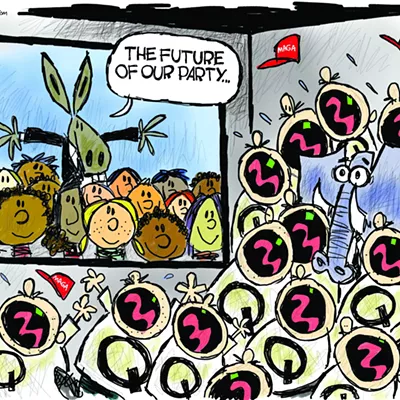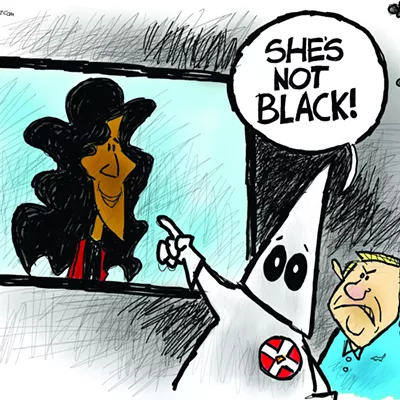The Republicans have long been expert good at the get-out-the-vote effort, dominating state politics throughout the '90s. But the lively effort is a new approach for the state Democratic Party, which has often failed to even mount a token effort in past years.
For Democrats, the race means everything. With newly drawn legislative districts favoring the GOP, Republicans should firmly control both chambers when the state Legislature gets to work in January. If the Democrats are going to have any influence at the Capitol next year, Napolitano has to be sitting on the ninth floor.
BOTH CANDIDATES ARE young rising stars in their respective parties. As attorney general, Napolitano has cultivated a political base across the state in preparation for her gubernatorial run. She started out of the box as the anointed candidate and never looked back, winning a four-way primary with 57 percent of the vote.
Born in New York City, the 44-year-old Napolitano grew up in Albuquerque, N.M. She earned her B.S. at the University of Santa Clara in '79 and her law degree from the University of Virginia in '83. Following her graduation, she moved to Arizona and went to work for the powerful Lewis and Roca law firm. Her most high-profile political work during that time came in 1991, when she joined the legal team supporting Anita Hill in her testimony opposing the nomination of Clarence Thomas to the U.S. Supreme Court.
Her Democratic connections paid off in 1993, when Bill Clinton named her U.S. Attorney for Arizona. In 1997, she resigned from the post to run for Arizona Attorney General. She was the only Democrat to win statewide office in 1998, beating Republican Tom McGovern, a deputy AG whose campaign had been damaged in a primary mudslide.
Four years later, she's looking to take the next step. "I thought Arizona needed a change in direction," she says. "With all humility, given my experience both as AG and U.S. Attorney, I'm the right person at the right time."
Salmon, naturally, begs to disagree. Born in Salt Lake City in 1958, Salmon grew up in Mesa and earned his degree at ASU. A Mormon mission took him abroad to Taiwan in the late '70s, where he learned to speak Mandarin. When he returned, he picked up a master's in public administration at BYU and came back to Arizona, taking a job with US West.
Salmon jumped into politics in 1990, upsetting an incumbent in a state Senate race. He served two terms before winning a congressional seat in 1994 on the coattails of the Contract With America. After the GOP took a pounding at the polls in 1998, Salmon complained that he was serving in the "Seinfeld Congress--it was about nothing." Feeling as though the party's principles had been abandoned, Salmon turned on Newt Gingrich during an appearance on the Today show and a few days later, Newt gave up his leadership position.
At the end of his third term in 2000, Salmon stepped down, honoring his pledge to serve just six years. Returning to Arizona, he launched a lobbying career, representing clients such as Qwest, the city of Phoenix and the liquor industry. He also began laying the groundwork for his gubernatorial run, including tapping former VP Dan Quayle as his campaign chair.
Like Napolitano, Salmon easily dispatched his primary opponents, winning the three-way contest with 56 percent of the vote.
With the preliminary bouts over, the main event looms on November 5.
GIVEN THE STATE'S WRETCHED fiscal health, it's almost a surprise anybody would want the governor's job. The collapse of the stock market, a tough job market and declining consumer confidence has punctured the state's ballooning budget, forcing lawmakers to make a billion-buck cut in the current fiscal year.
The worst may be yet to come. Many of those cuts came by delaying planned spending. With those bills still looming, future decisions will almost certainly be more painful to Arizona residents; Gov. Jane Dee Hull has already proposed eliminating the purchase of new textbooks and cutting back on the revenues that the state shares with cities and towns.
The most recent report from the state's Joint Legislative Budget Committee shows that tax collections are $115 million below projections just three months into the fiscal year. If the trend continues, the state may need to cut spending by as much as $500 million in the current fiscal year. State officials now estimate that the budget for next year could be even tighter.
Before the state can tackle any of the pressing problems that it faces--struggling schools and universities, rising healthcare costs, overcrowded prisons, low pay for state workers--it must first find a way to stanch the flow of red ink.
Napolitano was the first to release a detailed budget plan. She called for an aggregate cut of 10 percent in administrative spending, sparing only K-12 education and the Department of Corrections; capturing federal healthcare funds; and tapping surpluses in various special funds. She also supports the passage of Prop 303, which increases the tobacco tax to cover healthcare expenses. She estimates these steps would close the gap by some $389 million.
She's also crimped some ideas from former primary opponent Alfredo Gutierrez, such as taxing natural gas utilities, massage services and telemarketers. Aside from those specifics, she favors an overhaul of the state tax code. She promises to appoint a budget review panel to study the state tax code from top to bottom, including exemptions and credits, "to see if they still make economic sense. The goal ought to be to keep our taxes as low as possible on as broad a base as possible." She hopes to capture another $200 million in revenue through the review, as well as finding additional $300 million in cuts.
Salmon has criticized Napolitano's plan as "wanting," but his own blueprint is equally shy on specifics. He calls for a deeper cut in agency spending totaling $250 million, sparing just K-12 education and state-shared revenues. He says the state can achieve savings by consolidating agencies, privatizing government functions such as the Department of Corrections and refinancing debt to take advantage of low interest rates. He also proposes selling off state land and assets in a giant statewide yard sale.
Sensitive to the negative political impact of specifying precise cuts, neither candidate has put forward a detailed list of what they're going to cut when the budget ax really starts to swing. But their plans do illustrate their different perspectives on economic policy.
Napolitano blames the current financial mess on a lack of leadership from Legislature and the governor's office, which have both been controlled by the GOP. She says the state failed to make investments during the good times and now has no money set aside for the bad times. Only by reviewing and reinventing the tax code, says Napolitano, can the state find firm financial footing for the future.
A hardcore supply-sider, Salmon essentially sees government is the enemy of the working man. In times of crisis, he says, it's government that should tighten its belt, not working families.
Salmon is locked in read-my-lips mode: he vows he won't increase taxes under any circumstances. Government is simply spending too much money; citing the conservative Goldwater Institute, he argues that if the budget had kept simply kept pace with inflation and population growth, the state would have a surplus of more than a hundred million dollars.
It's true that the state budget has swelled over the last 14 years. But according to figures from the Joint Legislative Budget Committee, Salmon's calculation fails to take into account some big-ticket new expenses, such as the state shouldering the responsibility of building new schools, as well as additional income the state gets through new revenue sources, primarily the six-tenths-of-a-cent sales tax dedicated to education that voters passed in 2000.
If you subtract those items--in other words, if you compare apples to apples, budget-wise--then you see a different picture: state expenditures have grown on average by 5.5 percent annually, or just .1 percent faster than the rate of inflation over the last 14 years.
Salmon has no patience for those kinds of distinctions. "I think there's a big flaw with how they did that analysis," he says. "I know the Goldwater Institute said it's been over $900 million over population growth and inflation combined in the last decade."
To Salmon, government has simply grown too large and needs to be cut. He says everything except K-12 education and state-shared revenues is "on the table."
Arguing that the real key to economic health is job creation, Salmon released a "blueprint" for creating 500,000 new jobs paying a minimum of $40,000 a year. But, other than repeating the pledge to create those 400,000 jobs 14 times in 13 pages, the plan reveals little about the approach, other than reducing government regulations and taxes. Which regulations? Which taxes? Judging from the details in the document, your guess is as good as Salmon's.
Salmon is so anti-tax that he even proposes far-out schemes such as having a public vote on county property valuations to prevent rising real-estate values from increasing property taxes. Under the current system, county assessors oversee a staff of appraisers that peg property values according to the market; those property values form the basis for the tax rate levied by counties, school districts and other jurisdictions. Salmon supports allowing voters to approve a county's property valuation at the ballot box if property values increase. Never mind that it would create a politicized market value that might not reflect what people actually pay for their homes. "We need to get a real truth in taxation bill that has some teeth some teeth," Salmon says. "There ought to be some integrity in the process."
THE BUDGET CRUNCH driveS the debate on the other problems facing the state. On education issues, for example, the candidates split sharply over the state's role, although both say they won't cut K-12 spending.
Overall, Salmon is far more supportive of privatizing education than Napolitano. He supports tax vouchers for parents who pay to send their kids to private school, although he doesn't have a specific program in mind, and in general, seeks more "choice" for parents.
Napolitano opposes a voucher program to subsidize private schools until public schools have the funding they need. "In Arizona, vouchers would just be a mechanism to suck even more resources away from the public schools," she says.
Salmon wants to expand Arizona's program for educational tax credits. Under the program, taxpayers can donate up to $200 to extracurricular programs and get a full refund of the amount on their taxes.
Since the program was created in the mid-'90s, wealthy districts have grabbed most of the revenue--which makes sense, when you consider that people with higher income tend to itemize their tax returns and have enough money to make charitable contributions. Critics complain that the program takes dollars from the general fund that could be spread more equitably, essentially robbing from the poor to give to the rich.
Napolitano is "very concerned" about the discrepancy. "I don't think we know where the money is actually going and how it is being used and we have to demand accountability for all dollars that have education associated with them," she says.
Salmon supports expanding the program to allow contributions to be used not only for extracurricular activities but also in the classroom. He wants low-income workers who have trouble affording a contribution to their schools to have money automatically deducted from their paychecks and then returned to them when they apply for their tax refund--a sort of no-interest borrowing program for the state.
When it comes to paying the bills for school construction, Napolitano favors taking advantage of low interest rates to use bonds to build schools. The Legislature considered a bonding program during the last session, but eventually decided to use a lease-to-own program that critics say will cost more in the long run.
Salmon doesn't much like bonding or leasing; despite the budget crunch, he says the state shouldn't borrow to build new schools. "I've always supported a pay-as-you-go program," he says.
Napolitano and Salmon split on social issues, too. Salmon is a fierce pro-lifer who has vowed to leave the party if it were to abandon the right-to-life plank. "I would like to see abortions gone except to save the life of the mother and in cases of rape or incest," says Salmon.
Salmon says he's doubtful Roe V. Wade will be overturned in his lifetime, but he backs laws mandating women wait 24 hours after speaking with a physician to obtain an abortion. A supporter of parental notification of minors seeking abortions, Salmon is skeptical that a statistically significant number of young women would need an alternative, such as a judge's permission, because they might be victims of sexual abuse by family members.
Napolitano is pro-choice, opposing both 24-hour waiting periods--"I think it's designed to interfere with the right of people's choice and I don't favor putting restrictions on abortions beyond which you'd put on any other medical procedure"--and parental notification requirements.
Both candidates have captured the endorsements you'd expect. Napolitano has the teachers, labor unions and environmental organizations such as the Sierra Club and the League of Conservation Voters. Salmon has the National Rifle Association, the Tucson Chamber of Commerce and homebuilder and real-estate organizations.
They've both grabbed business and law-enforcement endorsements, with Salmon landing many of the police unions, including the Pima County Deputy Sheriffs Association and the Tucson Police Officers Association, while Napolitano has Pima County Sheriff Clarence Dupnik and Maricopa County Sheriff Joe Arpaio in her corner.
Salmon has grabbed celebrity endorsements from Ted Nugent, Alice Cooper and Dr. Laura Schlessinger, who calls Salmon her "new hero."
AS THE CAMPAIGN ENTERS the final stretch, the candidates are taking plenty of shots at each other. Napolitano's campaign has been hammering at Salmon since the Arizona Republic revealed that he failed to register as a federal lobbyist even while he was meeting with his former colleagues to persuade them to support a light-rail project for the city of Phoenix. Salmon maintains that he didn't ask anyone for a specific vote, so he considered himself a consultant, not a lobbyist.
Last week, Salmon tried to change the subject by painting Napolitano as soft on crime. First alongside Maricopa County Attorney Rick Romley in Phoenix and the next day with former state Sen. Patti Noland in Tucson, Salmon blasted Napolitano's record on victim's rights.
Napolitano has worked hard to inoculate herself against such an attack. As U.S. Attorney and Attorney General, she's built a reputation as a crime fighter. She not only supports the death penalty but favors shortening the appeals process. Arpaio and Dupnik both cut TV ads to defend her against the accusations.
The back-and-forth campaign ads are the most fierce air war in gubernatorial campaign history, reflecting the big-buck budgets of the campaigns. Boosted by a fundraiser hosted by President George W. Bush last month, Salmon has already raised more than $1.7 million. In addition, the Arizona Republican Party has spent $200,000 on an independent campaign committee run by Nathan Sproul, the former executive director of the state party. The group has been running television ads saying Napolitano will raise taxes if elected governor.
Thanks to the state's new Clean Elections program, Napolitano is matched dollar for dollar for that campaign spending, up to $ $1,844,790. In addition, the Arizona Democratic Party is putting up $200,000 for an independent campaign committee that has run attack ads portraying Salmon as a paid tool of special interests like Qwest.
The television ads highlight Napolitano's fraud case against the Baptist Foundation's Ponzi scheme that defrauded investors of hundreds of millions of dollars. She settled a case against the foundation and accounting firm Arthur Andersen that recovered some 83 cents on the dollar for bilked victims.
The ads also point out that Napolitano targeted Qwest Communications, socking them with a consumer fraud lawsuit over complaints that the phone company would ignore complaints from customers who had been hit with unwanted service changes and charges. At the same time, Salmon was lobbying on behalf of Qwest in the company's effort to enter the long-distance business in Arizona.
The full-court press from the Democratic Party comes because leaders recognize that, with the state Legislature mostly likely going seriously Republican, they must grab the governor's seat.
Even some moderate Republicans think Napolitano would bring better balance to state government. Jack Jewitt, the former lawmaker who now sits on the Arizona Board of Regents and heads up Tucson Medical Center, is a leader of Republicans for Napolitano, a group that includes Pima County Supervisor Ann Day, beer magnate Dorothy Finley and Flagstaff Mayor Joe Donaldson.
Jewitt says Napolitano will do a better job dealing with health care and education programs, including university funding. "I came to the conclusion that she represents those issues better," says Jewitt, a close confidant of Gov. Hull who is also supporting Democrat Terry Goddard over Republican Andrew Thomas in the Attorney General's race.
The GOP nominee countered last week with his own crossover group, Democrats for Salmon, a group that includes state Rep. Sylvia Laughter, Casa Grande Mayor Charles Walton and Tombstone Mayor Dustin Escapule. Even before the primary, Salmon was reaching out to the middle, particularly Hispanics. In August, he took a tour of South 12th Avenue with biz-friendly Democrat Jesse Lugo.
Lugo, who has lost both legislative and city council primaries in the last two years, says he supports Salmon because the Republican ran a bill supporting small gas-station owners back in his legislative days.
"We didn't forget Matt," says Lugo.










